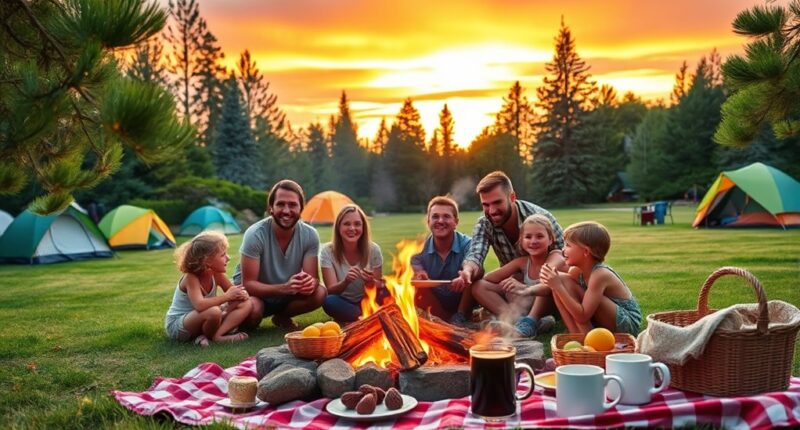Camping and outdoor adventures are perfect for the whole family, offering opportunities to bond, explore nature, and create unforgettable memories. With activities like hiking, nature scavenger hunts, and campfire storytelling, everyone can join in the fun. Plus, the camping trend is growing, making it easier to find diverse campsites and experiences. Engaging in eco-friendly practices and discovering unique destinations can enhance your adventure. Keep exploring to uncover even more tips for an amazing family camping experience!
Key Takeaways
- Family camping strengthens bonds through shared outdoor experiences, reducing stress and fostering teamwork in a natural setting.
- Unique activities like nature scavenger hunts and campsite games promote learning and physical activity for all ages.
- Emerging trends like glamping offer comfortable outdoor experiences, attracting families with eco-friendly amenities and curated adventure activities.
- Exploring diverse destinations, such as Costa Rica and Alaska, provides families with unforgettable adventures and opportunities for wildlife education.
- Practicing eco-friendly camping and “Leave No Trace” principles ensures a sustainable experience while enjoying the great outdoors.
The Rise of Family Camping
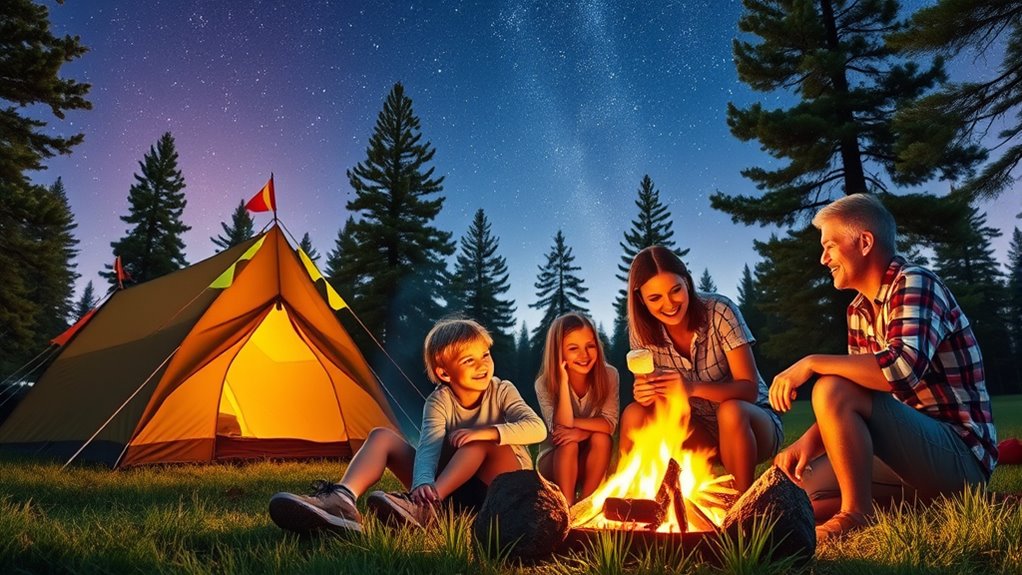
As more families seek affordable and adventurous getaways, the rise of family camping has become increasingly evident. Since 2014, there’ve been 7 million new camper households in the U.S., with 72% of campers venturing out three or more times a year.
By 2018, family camping reached an all-time high of 78.8 million households, and 66% of families intended to camp more often. This trend reflects a younger demographic, with 41% of new campers being millennials and 51% from multicultural backgrounds. Additionally, physical activities during camping have increased significantly, with hiking and backpacking up by 14% since 2014. The availability of diverse tent camping locations across New England provides families with numerous options to explore. It is important to consider long-term financial planning for such outdoor adventures, ensuring families can enjoy camping trips without financial strain. Investing in portable camping toilets can enhance comfort and convenience during these trips, making outdoor experiences more enjoyable. Furthermore, families can explore a variety of camping gear to enhance their comfort and enjoyment while camping in the great outdoors.
Moreover, many families are now incorporating backyard greenhouses into their camping experiences, allowing them to grow fresh food for their trips right at home. Amid rising travel costs, camping offers an economical option, averaging $50 per person per day. As families look for local camping adventures, they’re embracing activities like hiking and wildlife watching, making outdoor experiences more popular than ever.
Strengthening Bonds Through Nature
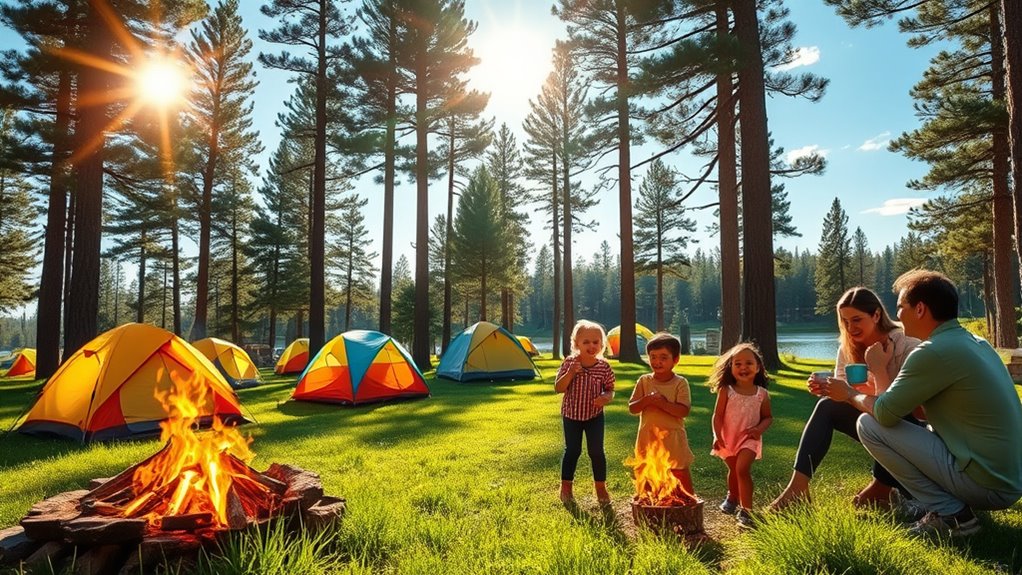
When you immerse yourself in nature with your family, you not only escape the daily grind but also strengthen emotional bonds that last a lifetime. Engaging in shared outdoor activities reduces stress and boosts your mood, fostering a sense of belonging. As you tackle challenges together, like setting up a campsite or traversing a trail, you enhance teamwork and communication, making problem-solving easier. You’ll find that stepping away from screens encourages more genuine interactions. Plus, fresh air invigorates your mental health, helping everyone feel more connected. These experiences create unforgettable memories that deepen your family ties, turning moments in nature into cherished stories passed down through generations. Camping provides a unique opportunity to disconnect from technology and immerse yourselves in the beauty of the outdoors. Embrace the outdoors and watch your relationships flourish! Engaging in these activities also helps develop essential skills in emergency preparedness, ensuring your family is ready for unexpected challenges while enjoying nature. Additionally, these outdoor experiences can foster emotional regulation, which is crucial for managing responses and enhancing interpersonal relationships. Furthermore, learning about water purification techniques can ensure your family stays safe and hydrated during your adventures, especially when you consider the importance of rainwater capture for sustainable water sources. Understanding purification methods will also empower you to confidently handle any water-related issues that may arise during your trip.
Embracing Diversity in Camping

Camping has transformed into a vibrant tapestry of cultures, inviting more people than ever to experience the great outdoors. With a significant rise in participation among African American, Asian, and Hispanic groups, you’ll notice that about 39% of campers now identify as non-white. This shift reflects a generational change, as younger, more diverse campers seek outdoor adventures. However, barriers like limited access and safety concerns still exist. Understanding different ethnic mindsets is crucial to effectively engage these communities and create a welcoming environment. To foster inclusivity, diverse workforces and culturally aware programs are essential. Additionally, incorporating primitive weapons into outdoor education can empower campers by teaching them self-reliance and survival skills. Effective co-parenting plans can also help families with diverse backgrounds feel more supported in their outdoor endeavors. Furthermore, acknowledging the importance of open communication about feelings can greatly enhance family bonding during these shared experiences. Partnering with organizations that serve minority communities can help break down obstacles. Embracing this diversity not only enriches your camping experience but also contributes to the economic sustainability of the outdoor industry, creating a welcoming environment for everyone. By leveraging smart shopping strategies on platforms like Amazon, families can find affordable gear that encourages outdoor exploration without breaking the bank. Moreover, understanding the health concerns by breed can ensure that pet owners prioritize their dogs’ well-being while enjoying outdoor activities together.
Emerging Trends: Glamping and Adventure Activities
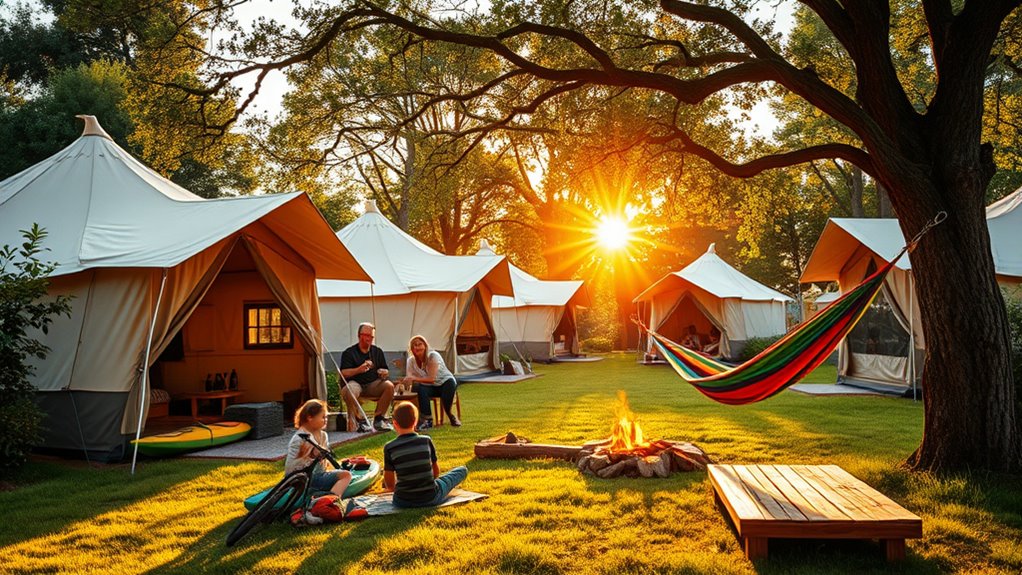
The growing diversity in camping experiences has paved the way for exciting trends like glamping and adventure activities.
Glamping, valued at around $3.45 billion in 2024, is rapidly expanding, especially in the U.S., where it’s projected to reach $1.30 billion by 2029. This luxury camping option attracts millennials, Gen Z, and families, offering unique experiences like treehouses and safari tents. Glamping offers a blend of traditional camping and modern technology, focusing on providing a comfortable outdoor experience. Many glamping sites now incorporate solar-powered solutions, enhancing their eco-friendly appeal and providing sustainable energy for guests. Additionally, these unique accommodations often feature innovative portable restroom solutions, ensuring that guests can enjoy comfort and convenience in the great outdoors. The incorporation of natural elements in glamping design also enhances the overall tranquility of the experience. Furthermore, engaging with nature can significantly improve emotional well-being for families, creating lasting memories together. Strategic planning can also help families budget for these experiences while considering potential tax implications related to their overall financial situation.
Alongside these accommodations, many glamping sites also offer curated adventure activities such as guided hikes and kayaking. This combination of luxury and adventure caters to diverse interests, making it perfect for family bonding. With a focus on sustainability and technology, glamping continues to evolve, ensuring unforgettable outdoor experiences for everyone involved.
Economic Benefits of Camping
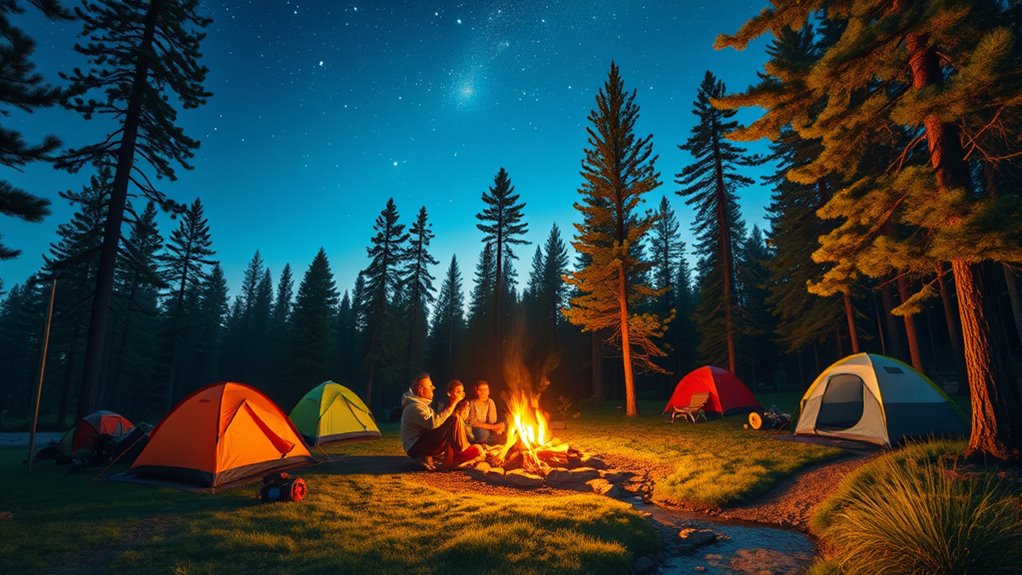
While many people think of camping as a way to escape into nature, it also serves as a significant economic engine for local communities. Campgrounds contribute $70 billion to the national economy and support about 1.1 million jobs across the U.S. Additionally, the influx of visitors during peak camping seasons can lead to a substantial increase in tourism-related revenue for these areas. Camping also promotes family bonding, which encourages families to travel together and explore new destinations. Furthermore, regular maintenance of camping facilities ensures that they remain appealing and safe for visitors, ultimately enhancing their experience. Water parks, such as those found in luxurious resorts, can also attract families looking for additional entertainment options during their camping trips. Moreover, the camping experience often leads families to develop better financial habits, such as creating a budget for their trips.
With campers spending an estimated $3.2 million annually per campground, local businesses thrive. Restaurants, gas stations, and retail stores benefit from increased patronage, leading to new dining options and improved services. This economic impact is particularly evident as camping generates significant revenue for local communities, enhancing their overall vitality.
The camping industry boosts household incomes through job creation and enhances local infrastructure, as communities invest in roads and utilities to accommodate tourists.
Popular Activities for Families
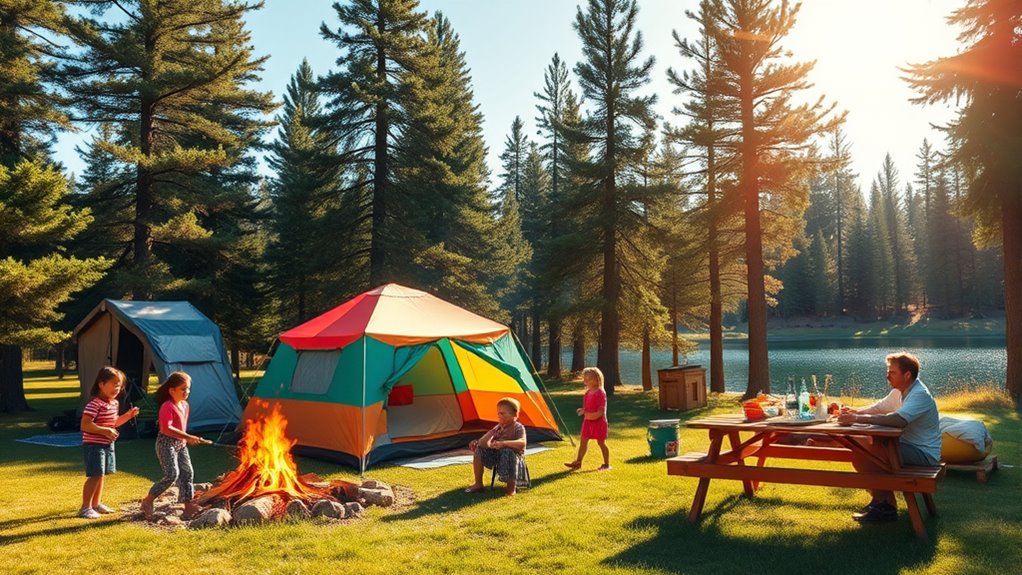
Families find countless ways to enjoy the great outdoors together, making lasting memories through a variety of fun activities.
You can set up bike, trike, or scooter games at your campsite, while ball games like soccer or Frisbee provide easy entertainment. Nature scavenger hunts teach kids about local plants and animals, and exploring hiking trails promotes bonding and exercise.
Campfire activities, like storytelling and building a fire, involve everyone and create lasting connections. For water fun, swimming, kayaking, or fishing can enhance your experience if you’re near a lake or river.
As night falls, enjoy magical night walks, campfire sing-alongs, or stargazing, fostering creativity and deepening family ties under the stars.
Eco-Friendly Camping Practices
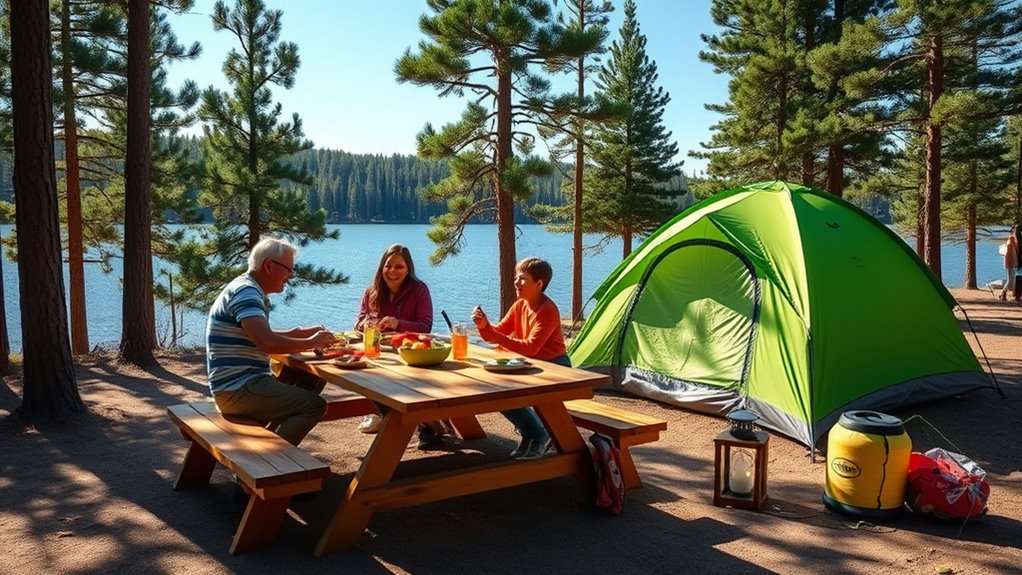
Camping can be a fantastic way to connect with nature, but it’s important to do so responsibly. Start by selecting sustainable gear made from recycled or organic materials. Opt for durable, multi-use items to minimize waste and consider borrowing or renting equipment instead of buying new.
Always follow the “Leave No Trace” principles: pack out all trash, camp in designated areas, and stay on established trails. Conserve water by collecting rainwater and using eco-friendly soaps. Observe wildlife from a safe distance, never feed them, and secure food properly.
Finally, choose eco-conscious transportation by carpooling or using public transport to reduce emissions. These practices guarantee you enjoy the outdoors while protecting the environment for future generations.
Unique Destinations for Family Adventures
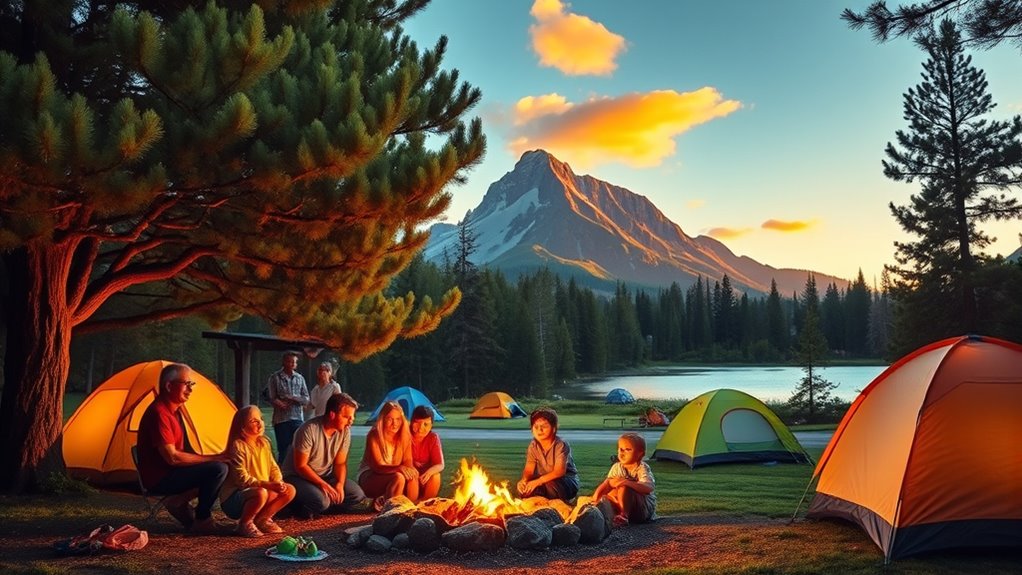
Exploring unique destinations for family adventures can create lasting memories and strengthen bonds as you discover the great outdoors together.
Consider Costa Rica, where you can zip-line through lush rainforests and relax in hot springs.
Experience the thrill of zip-lining through Costa Rica’s vibrant rainforests and unwind in rejuvenating hot springs.
Alaska offers stunning landscapes for wildlife viewing and glacier tours, perfect for teamwork and learning.
Iceland’s geysers and waterfalls provide a fascinating backdrop, while whale watching engages kids with marine biology.
In Botswana, wildlife safaris teach your family about conservation and African ecosystems.
Finally, the Dolomites in Italy offer hiking and climbing adventures for all ages.
Each destination combines excitement with educational opportunities, ensuring your family leaves with unforgettable experiences and a deeper appreciation for nature.
The Future of Family Camping Experiences
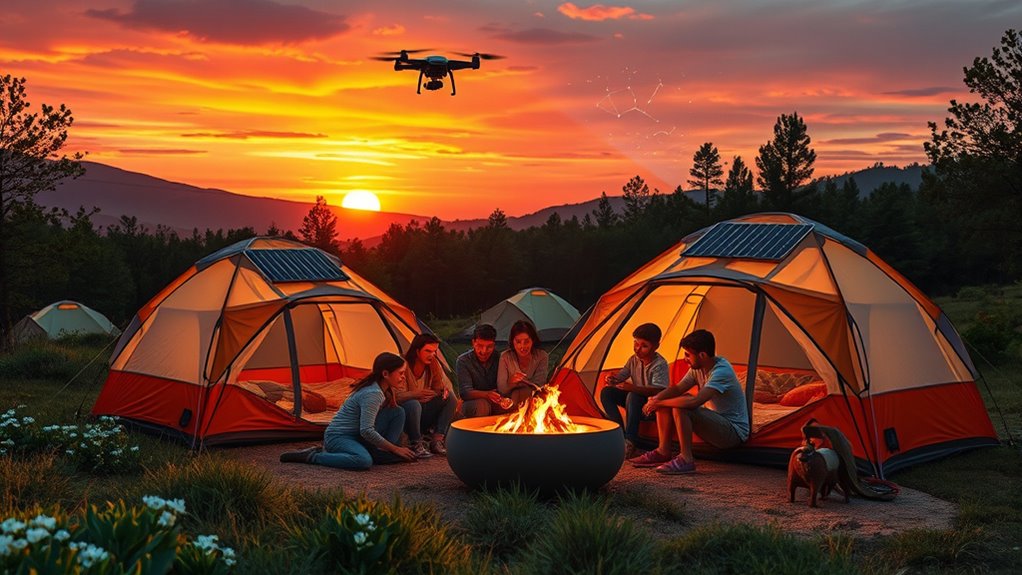
As the landscape of outdoor experiences evolves, the future of family camping looks bright and inviting, filled with new opportunities for adventure and connection.
You’ll likely see a surge in glamping, making it easier to enjoy nature without sacrificing comfort. With mobile apps simplifying bookings, planning your next trip becomes a breeze.
Families are prioritizing sustainability, choosing eco-friendly campsites that reflect their values. Expect immersive experiences like guided hikes and stargazing, allowing you to bond over shared adventures.
As technology enhances your camping experience—think smart gear and Wi-Fi hotspots—you can stay connected while enjoying the great outdoors.
Ultimately, with an emphasis on pet-friendly options and culinary experiences, future camping trips will cater to all family members, creating lasting memories.
Frequently Asked Questions
What Essential Gear Do Families Need for Camping Trips?
For your camping trips, you’ll need essential gear to guarantee a smooth experience.
Start with a properly sized tent and a ground cover for protection. Don’t forget sleeping bags rated for the temperature and comfortable sleeping pads.
Pack layered clothing, sturdy shoes, and rain gear for unpredictable weather.
Bring a camp stove, cooking utensils, and a first aid kit.
Finally, include flashlights, insect repellent, and some outdoor games for entertainment.
How Can Families Ensure Safety While Camping?
Imagine setting off on an adventure, but safety’s your compass. To guarantee your family’s safety while camping, research campsites carefully—look for facilities and natural hazards.
Pack essentials like a first aid kit and weather-appropriate clothing. Establish clear safety rules; teach kids about boundaries and emergency protocols.
Monitor health conditions by keeping everyone hydrated and protected from the sun. With these steps, you’ll create a secure environment for unforgettable memories under the stars.
Are There Camping Tips for First-Time Campers?
Absolutely, if you’re a first-time camper, start by selecting a well-established campsite with basic amenities.
Create a packing checklist to avoid forgetting essentials. Familiarize yourself with your gear by practicing setup at home.
Plan a short trip to ease into the experience and always check the weather beforehand.
Finally, invest in quality camping gear to enhance comfort and safety during your adventure.
Enjoy your journey into the great outdoors!
What Are the Best Camping Recipes for Families?
When you think about family camping, it’s like a scene straight out of a classic movie—everyone gathered around, sharing stories and meals.
For easy camping recipes, whip up one-pot chili, make breakfast burritos, or enjoy classic PB&J sandwiches. You can also have fun with tin foil dinners or personalize pita pizzas.
Don’t forget the s’mores for dessert! These meals are simple, delicious, and will keep your crew happy and satisfied.
How Can Families Manage Camping With Pets?
To manage camping with pets, start by researching pet-friendly campgrounds and their rules.
Schedule a vet check-up to guarantee your pets are healthy and ready for the trip.
Pack essentials like food, water, and a first aid kit.
Keep your pets leashed at all times for safety and comfort.
Plan activities that suit their energy levels, and always monitor their well-being, adjusting your plans as needed to keep them happy and safe.
Conclusion
As you pack your bags for your next family camping trip, you might just stumble upon a hidden waterfall or a cozy campfire story that sparks a lifelong memory. Camping isn’t just about escaping the hustle; it’s about connecting with each other and nature. With glamping options and eco-friendly practices, there’s something for everyone. So, why not embrace the adventure? Grab your gear and get ready to create unforgettable moments together under the stars!
